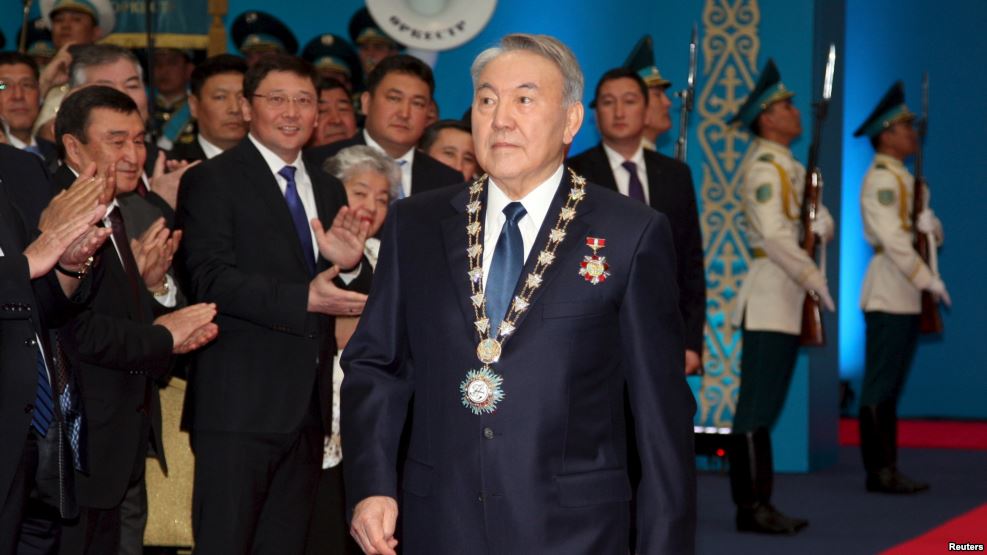 Kazakhstan’s 25 years of political stability owe much to the leadership of President Nursultan Nazarbayev, making the prospect of the septuagenarian’s departure a significant source of the jitters for investors in the country.
Kazakhstan’s 25 years of political stability owe much to the leadership of President Nursultan Nazarbayev, making the prospect of the septuagenarian’s departure a significant source of the jitters for investors in the country.
Yet now, personnel movements and investment activities involving members of the Nazarbayev family, alongside institutional reforms, indicate that preparations for his succession may finally be in the offing. The handover of power, when it comes, threatens to unbalance the predictability of the political environment and fuel uncertainty over the future direction of government policy.
Nazarbayev has long kept the Kazakh elite, people and investors guessing as to whom he might crown as his successor. The apparent lack of preparation has raised fears that the transition will cause elite infighting or popular upheaval. Signs that succession planning is now under way are therefore encouraging for future political stability. However, those expecting the crowning of an heir may be wrong-footed. Developments suggest that a fundamental change in Kazakhstan’s governance structure – a shift away from a single strongman at the top towards a more collective system of leadership – is being considered, which would result in a more complex political landscape.
The appointment of the president’s eldest daughter Dariga Nazarbayeva to the post of deputy prime minister in 2015 not only marked the culmination of her political rehabilitation but also signalled that transition planning had started. The move was probably intended as a test of her executive skills and of the willingness of the wider Kazakh elite to accept her as a significant political figure.
More recently, Samat Abish, Nazarbayev’s nephew, was promoted to deputy chairman of the security services, positioning him to help manage the transition process once the need arises. A prospective further promotion of Samat Abish to chairman would signal that transition is imminent.
Personnel movements are only part of the picture. The Nazarbayev family is rumoured to be repatriating foreign assets. Resource sharing among the different factions of a country’s elite is a key driver of stability under authoritarian regimes and, as such, resource (re-)distribution is a crucial feature of a succession process. Consequently, the domiciling of assets should be seen as preparation for political transition. By bringing home investment to Kazakhstan, the family portrays itself as ‘a responsible elite’, promoting and underpinning the country’s economic development.
Thus, the privatisation process detailed in late 2015 may serve as a vehicle to create investment opportunities for the family. By ‘onshoring’ assets the Nazarbayev family also sets a helpful example for the wider elite, which has been encouraged by the government to return its investments to Kazakhstan. Needless to say, the function of the privatisation process as a pre-transition mechanism for shifting resource distribution within the Kazakh elite should concern foreign investors considering partaking in the process.
The run-up and aftermath of the March parliamentary election holds some clues to the depth of change being considered at the top. The potential for constitutional reform raised in relation to the election, which Nazarbayev personally confirmed following the vote, suggests that institutional changes may be on the cards. Such speculation comes as the government seeks to bolster the country’s governance structures in preparation for the post-Nazarbayev era through wider institutional and administrative reforms.
Nazarbayev is, most likely, acutely aware that there are no obvious candidates to follow in his footsteps as the ‘father of the nation’, rendering the continuation of a personalistic system of government untenable. As a result, the importance of strong institutions increases exponentially, and it raises the question as to whether Nazarbayev even intends to install a successor or is seeking to transition towards a more collective style of government supported by stronger institutions. This could have the added benefit of securing the future of the Nazarbayev clan by placing family members into key positions while avoiding a potential backlash, from within the elite and the populace, over designating a single successor.
A more collective style of government would prove challenging for foreign investors as policy and political volatility increase without a single power broker to arbitrate between members of the governing elite. Policy differences are known to exist even within the Nazarbayev clan. For instance, Timur Kulibayev, the husband of Dariga’s younger sister Dinara, and those close to him are known to have radically different ideas for the economic development of Kazakhstan relative to the president and the current government.
It is reassuring for the country’s stability that the transition is finally being organised. Nevertheless, a fundamental shift in the governance system is a difficult reform to pull off in an environment of vested interests and weakly embedded institutions. Thus, while the risk of a transition-induced political meltdown could be mitigated by Nazarbayev’s planning, uncertainty is on the rise. The high-stake gambit may not come off and even if it does, collective governance will, at best, involve constant policy negotiation between factions of the elite.
In this scenario, the future would present business with a radically different political landscape to navigate from the one they have become accustomed to over the past quarter of a century.
Camilla Hagelund is senior analyst at Verisk Maplecroft.
THE FINANCIAL TIMES, 3.05.2016




